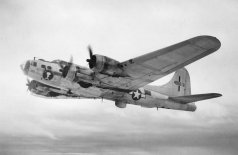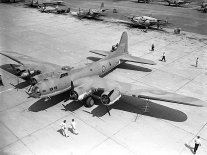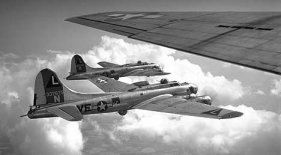
B-17 Flying Fortress
In the mid-1930s, Boeing engineers suggested a big bomber to the US Army Air Corps. The best American bomber at the time was an inadequate, twin-engined adaption of the DC-3 transport. The decision to go ahead with the B-17 Flying Fortress was a courageous leap forward: it gave the United States an embryonic bomber force by the time of the attack on Pearl Harbor. Early B-17s did not have enough guns and were not available in sufficient numbers, but as the war progressed the Flying Fortresses took command of the skies.
B-17 crews faced unspeakabke horror, pressing ahead into Luftwaffe fighters and flak while blinded by smoke, beaten by turbulence, plagued with mechanical mishaps and paralysed by numbing cold. On the first Berlin mission, B-17 crewmen killed in the air numbered the same as Germans killed on the ground by bombs (about 400). As the bombing campaign wore on casualties aboard the B-17s remained high, but the bombing became more effective.
Boeing's Flying Fortress was one of the most important bombers in history. B-17s fought in every theatre of World War II, but won immortality in their epic daylight battles against the Luftwaffe in which thousands of young American flyers lost their lives transforming the impotent United States Army Air Force of early 1943 into a force of devastating, destructive power just 12 ,months later.
 |
 |
 |
| The Flying Fortress was America's main strategic weapon in Europe during World War II. From the summer of 1943, huge numbers of Boeing's great silver bird were to be found on English airfields. |
The B-17 soldiered on after World War II in some oddball roles. This is a rescue aircraft with a lifeboat carried under the fuselage. |
The Fortress was tough, but over Germany it was pitted against some of the most experienced fighter pilots in the world, and losses were heavy. |
|
B-17 Flying Fortress (Technical Specification) |
| Role |
Nine or ten long range bomber |
| Manufacturer |
Boeing |
| Maximum Speed |
462 kmh (287 mph) |
| Maximum Range |
3,220 km (2,000 miles) |
Weight
Empty
Loaded weight |
16,391 kg (36,136 lbs)
29,710 kg (65,499 lbs) |
Dimensions
Wingspan
Length
Height
Wing Area |
31.62 meters (103 ft 9 in)
22.66 meters (74 ft 4 in)
5.82 meters (19 ft 1 in)
131.92 square meters (1,420 sq ft) |
| Engines |
One Allison V-1710-63 liquid cooled engine providing 8.95-kW (1,200 hp) |
| Armament |
Thirteen 12.7 mm machine gun in twin turrets, single dorsal and fore and aft beam positions
8000 kg (17,640 lbs) maximum bombload
|
Photo Gallery
Click here to submit your photo
| Have A Passion For Aircraft? |
Subscribe to our 14 series FREE newsletter
delivered weekly on World War 2 Aircraft factfile... |
| NB:- We hate spam as much as you do, so your email address will NEVER be shared with or sold to anyone else. That's a Guarantee. |
|
|








